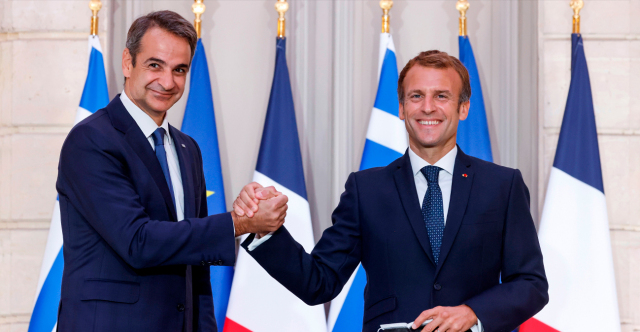French President Emanuel Macron reiterated France’s commitment to protecting the rights of Greece and Cyprus in their maritime regions during the World Ocean Conference in Nice. His remarks hold considerable significance, especially amid increasing challenges to Greek sovereign rights in the Aegean and Eastern Mediterranean posed by Turkey, particularly regarding Marine Spatial Planning, Marine Parks, and the Cyprus-Crete electricity interconnection.
By the end of the month, Greece is set to establish the Ionian and Southern Cyclades Marine Parks, as announced by Kyriakos Mitsotakis at the conference. This announcement has been pending for several months and stirred strong reactions from Turkey when first proposed last year. Despite these Marine Parks being confined to Greek territorial waters of 6 nautical miles, Turkey has raised concerns through its “Grey Zones” theory, asserting that numerous islets included in these parks are subject to “disputed sovereignty.”
The announcement of a Marine Park in the Southern Cyclades notably excludes many islands that Turkey disputes, which were mentioned in unofficial maps, leaving them out of future planning discussions.
Equally contentious is the issue of Maritime Spatial Planning. Greece presented its base map on April 16, but the detailed maps outlining permitted activities in maritime zones are still under development, hindering their submission to the Commission and delaying the suspension of fines from the European Court of Justice. Greece’s map reflects potential maritime zones as per the Law of the Sea, indicating territorial waters in the Aegean at 6 nautical miles, while asserting its right to extend these boundaries according to international law.
While Turkey’s reaction to the Marine Parks is expected, the critical point will be whether it escalates from rhetoric to action when scientific and environmental initiatives commence on the designated rocky islets.
Turkey has also proposed its own Marine Protected Area (MPA) that overlaps with much of Greece’s maritime zones and intends to submit this plan to relevant international organizations soon.
In the near term, Greece must make decisions regarding the expansion of marine parks, finalize the FSM, and continue the Cyprus-Crete electricity interconnection project, ensuring it does not appear to retreat in exercising its rights due to Turkish threats.
Athens, navigating a challenging atmosphere, aims to sustain Greek-Turkish rapprochement, with two meetings scheduled this week: the Thetical Agenda with Deputy Foreign Minister Tassos Hadjivassiliou in Athens, and a Political Dialogue in Ankara on Thursday led by Deputy Foreign Minister Alexandra Papadopoulou. These discussions aim to set the stage for the High Cooperation Council and the upcoming Mitsotakis-Erdoğan meeting in early July. They will also meet at the NATO summit in The Hague (June 24-25), though the summit’s agenda and Donald Trump’s first NATO appearance may limit the time for extensive bilateral discussions.
Recent months have seen increased tension due to Turkey’s aggressive rhetoric regarding the CFE and Marine Parks, as well as its objections to the continuation of the Cyprus-Crete electricity interconnection project. Additionally, Greece is working to set conditions at the European level concerning Turkey’s involvement in a major rearmament program, which is economically and politically significant for Ankara as it views this as a crucial step toward participating in European integration, particularly in European Defence.
Ask me anything
Explore related questions

















